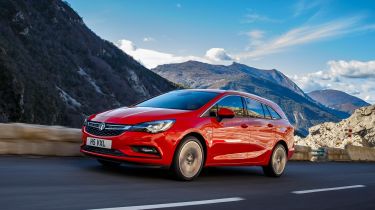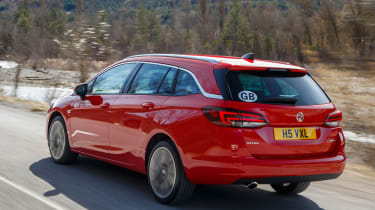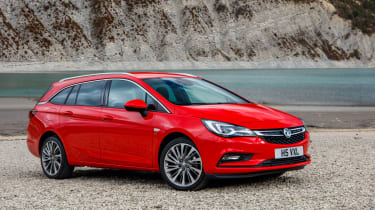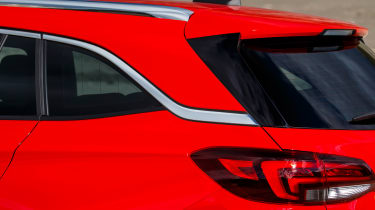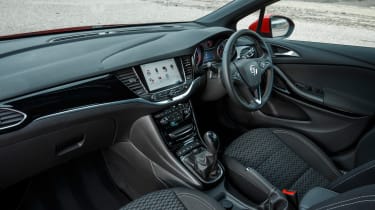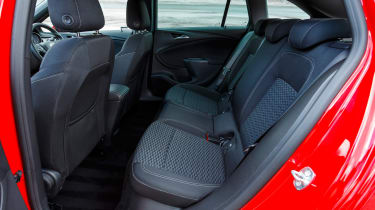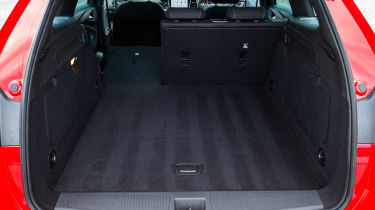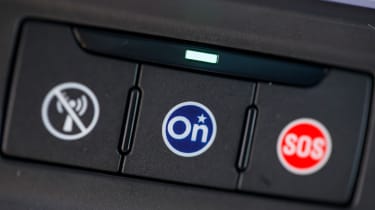Vauxhall Astra Sports Tourer (2016-2020) review
The Astra Sports Tourer is well equipped, good to drive and has efficient engines, but it's not the biggest estate on sale

Ever since the Vauxhall Astra went on sale in 1979, there has been an Astra estate available for buyers wanting more space than the hatchback could provide, but that don't want to move up to a larger car. The current estate is known as the Astra Sports Tourer, and it went on sale not long after the Mk7 Astra hatchback in 2016.
As with any other compact family estate, the Astra Sports Tourer looks largely identical to the hatchback, save for the extended roof line, extra 332mm of bodywork behind the rear wheels and the large upright tailgate. Inside there are plenty of similarities, too, although rear seat passengers get a little bit of extra headroom and there's a 580-litre boot, compared to 370 litres for the hatch. There's also 1,630 litres of space with the back seats folded, which is 420 litres more than the hatchback.
The Astra Sports Tourer range mirrors that of the hatchback, with a broad range of trims and engines, although as is traditional with Vauxhall, not all engines are offered in all trims. And the trims themselves don't follow on from each other, as some of them are tailored for fleet sales rather than private buyers. It also means that some more expensive versions of the Astra Sports Tourer aren't necessarily as well equipped as cheaper cars.
Used - available now

2019 Vauxhall
Astra
35,020 milesManualPetrol1.6L
Cash £9,495
2025 Vauxhall
Astra
5,918 milesManualPetrol1.2L
Cash £17,300
2021 Vauxhall
Astra
50,322 milesManualPetrol1.2L
Cash £10,203
2019 Vauxhall
Astra
52,192 milesManualPetrol1.0L
Cash £6,350Trim levels start with Design, then progress through Tech Line Nav, SRi, SE and Elite Nav trims - Ultimate spec has yet to be announced for the Sports Tourer. While SRi and SE models are pricier than Tech Line Nav, sat nav costs extra on both of them, but on the whole every model in the Astra Sports Tourer range is reasonably well equipped, and with so much choice, it's not difficult to find a spec to suit you.
Engines comprise 1.0 and 1.4 petrol and 1.6 diesel units in various power outputs. The entry point to the range is a 1.4 100PS unit. This naturally aspirated 99bhp engine is an older unit that's not as powerful nor as efficient as the 105PS 1.0 Turbo ecoTEC three-cylinder that's available for a little extra. This engine is a reasonable performer, although might struggle with a full boot. Both the 1.4 and 1.0T get a five-speed manual gearbox, and there's no auto option.
There's a second 1.4-litre petrol, this time turbocharged to make either 123bhp or 148bhp, depending if you choose the 125PS or 150PS versions. These both come with a six-speed manual gearbox to give them more flexibility, while the more powerful version has the option of a six-speed auto available.
Diesel power usually makes more sense in an estate, and the Astra Sports Tourer features a 1.6 CDTi in 110PS and 136PS BlueInjection guises, as well as a 160PS BiTurbo diesel. These have 108, 134 and 158bhp respectively, all come with a six-speed manual, while the 136PS version is also offered with a six-speed auto. Every model in the Astra Sports Tourer range is front-wheel drive.
Rivals for the Astra Sports Tourer are the same as for the hatch, where there's an estate offered. That means the Skoda Octavia Estate and Peugeot 308 SW as the class leaders for boot space, plus the Volkswagen Golf Estate, Ford Focus Estate, Renault Megane Sport Tourer, SEAT Leon ST, Hyundai i30 Tourer, Kia Ceed SW and Toyota Auris Touring Sports, while the Subaru Levorg Sport Tourer is a leftfield choice that doesn't have a hatchback equivalent.
The Astra Sports Tourer is better than ever, and is now a very capable mid-size estate. It's lighter, looks smarter and is better to drive than before, and Vauxhall offers a range of frugal yet powerful petrol and diesel engines, so you can be sure they'll cope with the larger loads estates like this normally carry.
However, the one thing that pegs the Astra Sports Tourer back from being the class best, like the hatchback, is that it doesn't have the outright space to compete with some compact estate rivals. And it doesn't make up for that capacity disadvantage with the kind of practical touches that help other rivals to stand out.
• Vauxhall Astra Sports Tourer group test
Engines, performance and drive
The Astra Mk7 is good to drive, offering a fine balance between tidy handling and a comfortable (if taut) ride. If the VW Golf is the comfortable option and the Ford Focus the best handling choice, the Astra is somewhere in between. Show the Astra a British B-road and it’ll reward the driver with a fairly sweet ride and handling balance. It’s much more comfortable than a Hyundai i30 Tourer over harsh surfaces, but it’s also more engaging.
The steering is well weighted and quicker than the i30’s, which means the Astra feels significantly more agile. Although the steering lacks feel and is quite light, there's not much body roll and grip is good through the corners. This, combined with a big weight saving over the previous model, means the Sports Tourer feels much more agile on the road.
Sporty SRi models get a firmer suspension set-up than standard, but while the Sports Tourer is a bit less cushioned over potholes as a result, the trade-off is more engaging handling with strong grip, fine balance and excellent body control. Still, the ride settles down on the motorway, at which point you can appreciate both the Astra’s low noise levels and its supremely comfortable seats and driving position.
The brakes are strong, but the pedal feel is a little odd and will take some getting used to. The driving position is comfortable so it won't be a chore to hop in and go for a drive. The manual gearbox has a smooth shift but it’s not quite as satisfying to use as the VW Golf's.
Engines
There are plenty of engine options in the Astra Sports Tourer, with most being solid choices - so you can be confident that there's one that will suit your needs. The diesel range offers plenty of power without a loss in fuel economy. The 109bhp 1.6-litre unit is the most economical, offering 89g/km emissions and 83.1mpg. Our pick would be the more powerful 134bhp model, which still manages an impressive 74.3mpg and feels punchy for its size. You'd swear it was a 2.0-litre in most situations.
Thanks to its 320Nm of torque from 2,000rpm, the 1.6 CDTi has strong in gear performance. When we tested the car, it took 4.6 seconds to go from 30-50mph in fourth gear, while the i30 Tourer and Megane Sports Tourer clocked 6.9 seconds and 6.4 seconds when we tested them at the same time. That’s a big difference when you’re going to overtake a vehicle, but it also highlights the Vauxhall’s advantage when carrying heavier loads. The four-cylinder diesel is a bit rattly, but because there’s more shove you don’t have to rev it as hard.
The petrol range includes an excellent 1.0-litre three-cylinder turbo, but it might be a little underpowered for lugging heavy loads - your best bet for that task is the torquey BiTurbo 1.6-litre diesel. There's also a 1.6-litre turbo petrol with 197bhp, and while it lacks a high fuel economy figure it certainly turns the Astra into a surprisingly fast estate.
MPG, CO2 and Running Costs
If low running costs are a priority, you could do a lot worse than picking a Vauxhall Astra Sports Tourer - the excellent range of diesels (and certain petrols) offers high economy figures and low company car tax costs. The best performer is the 109bhp 1.6-litre diesel, returning 83.1mpg and emitting just 89g/km.
The 1.0-litre petrol is the best of the petrols for economy, returning 62.8mpg and managing 103g/km. The 134bhp diesel is the top choice, offering low emissions, high economy and plenty of power for load-lugging.
Insurance groups
The Astra Sports Tourer fitted with the 1.0-litre petrol sits in insurance group 10E (depending on specification), which is very low - but of course that's because the engine is so small. Even the 1.6-litre turbo, which does 0-60mph in just 6.6 seconds, is in a relatively low group 21E.
Interior, design and technology
Estate cars usually look more plain than their hatchback counterparts, as they have to balance style with the practicalities of a load-carrying body. However, the Astra Sports Tourer cuts quite a dash, chiefly because it’s based on the smart five-door version.
It’s 332mm longer than the hatch, and all of the extra length has been added behind the rear wheels. This means engineers were able to carry over the standard car’s strut front suspension and its compact crank rear axle with Watts linkage.
Climb inside, and apart from the extra distance to the rear windscreen, the interior is identical to the five-door’s. Soft-touch plastics, chrome-trimmed control knobs, high-quality leather for the steering wheel and plenty of gloss-black trim give the car an upmarket feel, while the hi-tech layout looks great.
Sat-nav, stereo and infotainment
Vauxhall's IntelliLink system features on all Nav-spec Astras, and it's simple to operate and packed with features.
It features an eight-inch screen as standard, but it looks smaller than some rival units due to the way it’s integrated into the dashboard - the screen is surrounded by plastic. The interface is mostly white, which gives it a clean look, and it’s about as responsive to the touch as its rivals’. It's not as swift as a tablet computer, but on the move it's okay to use, without too much lag.
Apple CarPlay and Android Auto come as standard, and the system works similarly well on the screen. If you don’t use your smartphone for navigation, the built-in sat-nav works well enough, with European coverage and clear instructions.
Practicality, comfort and boot space
The Astra Sports Tourer obviously offers plenty more space inside than the hatch, thanks to that elongated roofline and rear overhang that means the boot is much bigger.
The opening is wide and square, which will make loading and unloading of heavy items a lot easier - and the dog will be able to jump in more easily, too. The rear seats split and fold down in a 40:20:40 pattern, so there's plenty of flexibility in the back as well. The well for the spare wheel means there's no under-floor storage, though.
Leg room, head room & passenger space
Even with the front seats set up for a tall driver and passenger, there's plenty of rear legroom, and getting in an out is easy thanks to the wide door openings. It looks like there's not going to be much room, but once you sit down you'll find that there's plenty of space, including headroom.
Boot
The Astra Sports Tourer has a 540-litre boot, which is 40 litres bigger than the old car, but smaller than the 660-litre Peugeot 308 SW. At least the load area is square and suffers no wheelarch intrusion, while the curve of the tailgate doesn’t interfere, either.
The back seats fold completely flat, but strangely the Vauxhall doesn’t benefit from levers in the boot like the Peugeot. The boot opening is marginally smaller than the Peugeot’s, too, but the floor lifts to reveal additional storage for a spare wheel (a repair kit is standard).
There's 1,630 litres of space in the Astra with the seats folded down - but that's quite a bit smaller than the Skoda's 1,740-litre area. Still, while the Astra isn't best in class for boot space, most buyers won't feel short-changed.
Reliability and Safety
The Astra has strong safety credentials, having been awarded a five-star Euro NCAP score in 2015. All cars get six airbags and stability control, plus autonomous emergency braking is standard.
The Sports Tourer comes with quite a bit more kit once you head into the options list. Lane Departure Warning and Lane Keep Assist help keep you in lane while on the motorway too, though these systems can be a little annoying at times.
There are self-parking systems available and road sign recognition so you always know the speed limit, even if you missed the sign yourself. There are front and side airbags for the driver and passenger, and full-length curtain airbags to protect all occupants.
Vauxhall's LED headlights are a pricey option at about £1,250, but the sophisticated adaptive matrix system automatically alters beam to suit the road, weather conditions and other motorists.
Warranty
Vauxhall used to offer a lifetime warranty for all its new cars, but that policy is long gone - so the Astra Sports Tourer gets an industry-standard three-year/60,000-mile warranty. There are plenty of dealers around the UK so servicing and repair costs should be kept in check, too.

